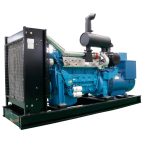The Power of Diesel Generators for Reliable Backup Power Solutions

Introduction
In today's fast-paced world, uninterrupted power supply is crucial for businesses, homes, and critical infrastructure. Power outages can disrupt operations, cause financial losses, and even jeopardize safety in emergency situations. To mitigate the risks associated with power failures, many individuals and organizations rely on backup power solutions such as diesel generators. In this article, we will explore the technology behind diesel generators, their benefits, applications, and best practices for ensuring reliable backup power.
Understanding Diesel Generators
Diesel generators are a type of internal combustion engine that converts diesel fuel into electrical energy. They consist of a diesel engine and an alternator, which work together to produce electricity when connected to a load. Diesel generators are commonly used as standby power sources in areas with unreliable grid power or as prime power sources in off-grid locations.
The diesel engine in a generator operates on the principle of compression ignition, where air is compressed to a high temperature, causing the diesel fuel to ignite spontaneously. This combustion process drives the pistons, which in turn rotate the crankshaft connected to the alternator. The alternator converts the mechanical energy into electrical energy through the process of electromagnetic induction.
Benefits of Diesel Generators
1. Reliability: Diesel generators are known for their robustness and reliability, making them ideal for backup power applications. Diesel engines are durable and can operate continuously for extended periods without overheating or experiencing mechanical failures.
2. Fuel Efficiency: Diesel fuel is more energy-dense than gasoline, which means that diesel generators can produce more power per unit of fuel consumed. This results in lower fuel consumption and operating costs compared to other types of generators.
3. Longevity: Diesel engines have a longer lifespan than gasoline engines due to their sturdier construction and lower operating temperatures. With proper maintenance, a diesel generator can provide reliable backup power for many years.
4. Quick Start-Up Time: Diesel generators can start and reach full power capacity within seconds, making them well-suited for applications where rapid power restoration is critical.
5. Versatility: Diesel generators come in a wide range of sizes and power outputs, making them suitable for a variety of applications, from small residential backup power to large industrial installations.
Applications of Diesel Generators
1. Commercial and Industrial Facilities: Businesses rely on diesel generators to ensure uninterrupted power supply for critical operations such as data centers, hospitals, manufacturing plants, and telecommunications infrastructure.
2. Construction Sites: Diesel generators are commonly used on construction sites to power tools, lighting, and temporary facilities where grid power is not available.
3. Residential Backup Power: Homeowners use diesel generators to keep essential appliances running during power outages, ensuring comfort and security for their families.
4. Remote Locations: Diesel generators are essential for powering off-grid installations such as remote telecommunications towers, mining sites, and oil rigs where grid power is not accessible.
5. Emergency Response: Diesel generators are deployed by emergency services and disaster relief organizations to provide power in emergency situations such as natural disasters, blackouts, and humanitarian crises.
Best Practices for Using Diesel Generators
1. Regular Maintenance: Proper maintenance is essential to ensure the reliable operation of a diesel generator. This includes regular oil and filter changes, fuel system checks, and inspection of critical components such as belts, hoses, and batteries.
2. Fuel Quality: Diesel fuel quality is crucial for the efficient and trouble-free operation of a generator. It is important to use clean, high-quality diesel fuel that meets the manufacturer's specifications to prevent fuel system clogging and engine damage.
3. Load Testing: Periodic load testing of the generator is necessary to ensure that it can handle the expected electrical load during a power outage. This helps identify any issues with the generator's performance and allows for timely maintenance or repairs.
4. Proper Installation: Diesel generators should be installed in a well-ventilated, weather-protected area with adequate clearance for ventilation and maintenance access. The generator should be connected to the electrical system through a transfer switch to ensure safe and seamless power transfer during an outage.
5. 200kw diesel generator and Remote Control: Advanced diesel generators come equipped with monitoring systems that allow for remote monitoring of key parameters such as fuel levels, battery voltage, and engine temperature. Remote control capabilities enable operators to start, stop, and adjust the generator settings from a distance, enhancing operational efficiency and responsiveness.
Conclusion

Diesel generators play a vital role in providing reliable backup power solutions for a wide range of applications, from commercial and industrial facilities to residential homes and emergency response operations. Their robustness, fuel efficiency, and quick start-up time make them an indispensable asset in ensuring uninterrupted power supply in the face of grid failures and emergencies. By following best practices for maintenance, fuel management, and operation, users can maximize the performance and longevity of their diesel generators, ensuring peace of mind and continuity of operations in any situation.
